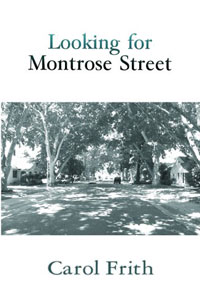|
Looking for Montrose StreetCarol FrithReview by Alyce Wilson Carol Frith's poems are alive with rich detail: sycamores and verbena, sugar cookies and moths with "wings yellow / with half-life." She shares stories about her family, especially the women: how they explore and cook and garden and sometimes grieve. She also writes movingly about a cousin with mental illness, whose troubles have become as predictable as the seasons: "Fall comes several / times a year, the voices thumping / against the kitchen window, / dusting the pane with chatter." In these textured and evocative poems explore the fickle recesses of memory. In "September Evening," the speaker engages in a conversation with her mother while gardening. "How much do you remember?" the mother asks, yet the speaker is focused on the present: "My husband's pruning pyracantha / from the driveway, cutting back for winter." As these poems reveal, those tactile memories of gardening, of baking, of a father pointing at constellations at a moonlit carnival, those memories ultimately come to symbolize entire lifetimes. A favorite aunt is remembered for her penchant to sing in the morning; another family member remembered for her colorful kitchen. Those tactile memories, Frith seems to say, become like ancestral relics. In "Italian Sonnet for My Mother," she begins with a stark observation: "If you are gone tomorrow, I'll open my mind / like a window and try to let you in / or out." Yet, thinking of her mother, what comes to her is one moment: "We are standing near morning glories. 'Listen,' / you say, 'they disappear into thin / light, and there is nothing more to find. / The sound is swallowed." Memories are like that, as Frith knows. Memories, like the people they evoke, are multicolored but wispy. She concludes, "In the still air, I / will recall a sad tangle of morning- / glories, blue as leftover sky." In Looking for Montrose Street, Frith captures memories with the precision of a master quilter, knowing all the while how ephemeral and mutable such memories are. Rating: **** (Must Read) Finishing Line Press, 2009: ISBN: 1-59924-380-6. |
